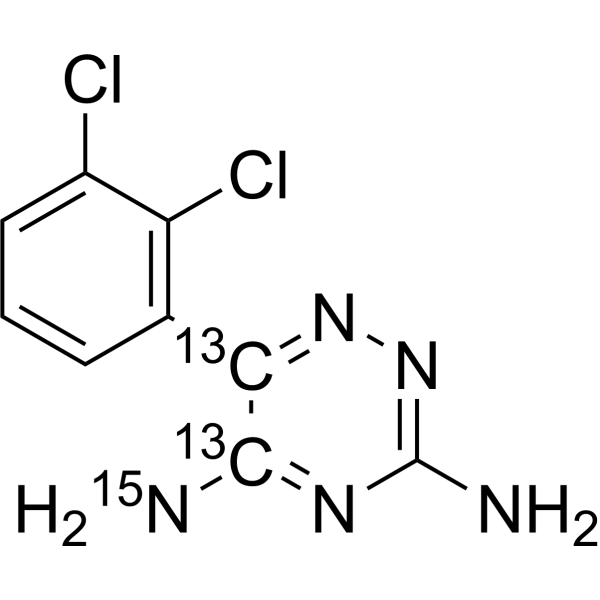Lamotrigine-13C2,15N
Modify Date: 2024-01-08 14:37:23

Lamotrigine-13C2,15N structure
|
Common Name | Lamotrigine-13C2,15N | ||
|---|---|---|---|---|
| CAS Number | 2483830-10-8 | Molecular Weight | 259.07 | |
| Density | N/A | Boiling Point | N/A | |
| Molecular Formula | C713C2H7Cl2N415N | Melting Point | N/A | |
| MSDS | N/A | Flash Point | N/A | |
Use of Lamotrigine-13C2,15NLamotrigine-13C2,15N is the 13C and 15N labeled Lamotrigine[1]. Lamotrigine (BW430C) is a potent and orally active anticonvulsant or antiepileptic agent. Lamotrigine selectively blocks voltage-gated Na+ channels, stabilizing presynaptic neuronal membranes and inhibiting glutamate release. Lamotrigine can be used for the research of epilepsy,?focal seizure, et al[2][3]. |
| Name | Lamotrigine-13C2,15N |
|---|
| Description | Lamotrigine-13C2,15N is the 13C and 15N labeled Lamotrigine[1]. Lamotrigine (BW430C) is a potent and orally active anticonvulsant or antiepileptic agent. Lamotrigine selectively blocks voltage-gated Na+ channels, stabilizing presynaptic neuronal membranes and inhibiting glutamate release. Lamotrigine can be used for the research of epilepsy,?focal seizure, et al[2][3]. |
|---|---|
| Related Catalog | |
| In Vitro | Stable heavy isotopes of hydrogen, carbon, and other elements have been incorporated into drug molecules, largely as tracers for quantitation during the drug development process. Deuteration has gained attention because of its potential to affect the pharmacokinetic and metabolic profiles of drugs[1]. |
| References |
| Molecular Formula | C713C2H7Cl2N415N |
|---|---|
| Molecular Weight | 259.07 |